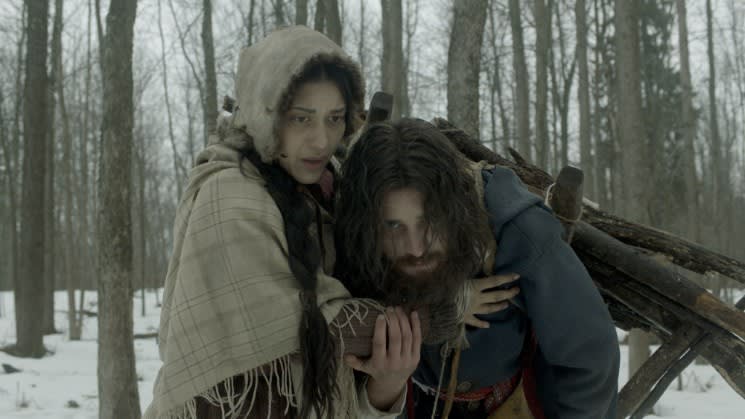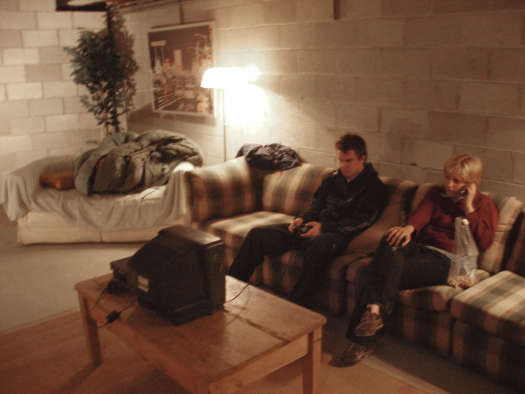Inspired by true events, Michelle Derosier and Marie-Hélène Cousineau's Angelique's Isle is a tale of survival and one that highlights Indigenous female power through Angelique Mott, an Ojibwe woman who was left stranded on Lake Superior's Isle Royale.
Angelique's Isle follows Mott (played by Julia Jones) and her fur trader husband Charlie (Charlie Carrick) during the copper rush in 1845. When prospectors from Detroit arrive in their town of Sault St. Marie, Ontario, Charlie volunteers for work hoping to make enough money to build a homestead with his young wife. Though Angelique is happy to accompany her husband, her grandmother (Tantoo Cardinal) cautions her about the dangers she has dreamed would come if she marries Charlie — but Angelique brushes off these dreams as superstitions.
Her grandmother's "superstitions," however, become reality as their prospection voyage begins. Traveling across Lake Superior to Isle Royale, it quickly becomes clear that these Detroit prospectors don't care about Ojibwe culture as long as it makes them rich. After finding nothing but rocks for days, Angelique stumbles upon a copper bolder with an Indigenous symbol carved into it. She cautions Charlie that she believes it would be best to leave it alone, but of course, he doesn't listen and neither do the other men. Angelique and Charlie are subsequently left behind on the Isle as the others return home for more equipment. When they realize that no one is coming back for them as promised, they must attempt to survive the North's brutal winter, in a wilderness where food and shelter are both scarce.
The relationship between Angelique and Charlie, full of the tender moments expressed between newlyweds, is tested as they begin to lose strength in both mind and body. It's an effective survival story that's heightened by both of their strong performances — especially Jones, whose Angelique is left alone in her struggle to balance her traditional Indigenous spirituality and newfound Christian faith. Her dreams reflect of residential schools, where the church beat the "Indian" out of children, stripping them of their spiritual and cultural beliefs, as well as their language. But as the cruelty of nature reveals itself, she must fully embrace her Ojibwe culture to help her survive.
Celiana Cárdenas's cinematography bathes the viewer in both the beauty and cruelty of its northern landscape, and the nature sounds overpower its score, emphasizing how important the land is to the people who inhabit it. But Angelique's Isle proves to be more than just a man-versus-nature story; Derosier's script is multilayered, and explores the cruelty of nature in the hands of the colonizer and the greed of men who exploit their land's natural resources. It's man-versus-greed, but also man-versus-Wendigo, a man-eating spirit of Algonquian folklore that unleashes its fury against the men chipping away at its land's treasure.
At its core, though, it's a film about the experiences of Indigenous women and how white men would stop at nothing to see them suffer until there's nothing left.
(levelFILM)Angelique's Isle follows Mott (played by Julia Jones) and her fur trader husband Charlie (Charlie Carrick) during the copper rush in 1845. When prospectors from Detroit arrive in their town of Sault St. Marie, Ontario, Charlie volunteers for work hoping to make enough money to build a homestead with his young wife. Though Angelique is happy to accompany her husband, her grandmother (Tantoo Cardinal) cautions her about the dangers she has dreamed would come if she marries Charlie — but Angelique brushes off these dreams as superstitions.
Her grandmother's "superstitions," however, become reality as their prospection voyage begins. Traveling across Lake Superior to Isle Royale, it quickly becomes clear that these Detroit prospectors don't care about Ojibwe culture as long as it makes them rich. After finding nothing but rocks for days, Angelique stumbles upon a copper bolder with an Indigenous symbol carved into it. She cautions Charlie that she believes it would be best to leave it alone, but of course, he doesn't listen and neither do the other men. Angelique and Charlie are subsequently left behind on the Isle as the others return home for more equipment. When they realize that no one is coming back for them as promised, they must attempt to survive the North's brutal winter, in a wilderness where food and shelter are both scarce.
The relationship between Angelique and Charlie, full of the tender moments expressed between newlyweds, is tested as they begin to lose strength in both mind and body. It's an effective survival story that's heightened by both of their strong performances — especially Jones, whose Angelique is left alone in her struggle to balance her traditional Indigenous spirituality and newfound Christian faith. Her dreams reflect of residential schools, where the church beat the "Indian" out of children, stripping them of their spiritual and cultural beliefs, as well as their language. But as the cruelty of nature reveals itself, she must fully embrace her Ojibwe culture to help her survive.
Celiana Cárdenas's cinematography bathes the viewer in both the beauty and cruelty of its northern landscape, and the nature sounds overpower its score, emphasizing how important the land is to the people who inhabit it. But Angelique's Isle proves to be more than just a man-versus-nature story; Derosier's script is multilayered, and explores the cruelty of nature in the hands of the colonizer and the greed of men who exploit their land's natural resources. It's man-versus-greed, but also man-versus-Wendigo, a man-eating spirit of Algonquian folklore that unleashes its fury against the men chipping away at its land's treasure.
At its core, though, it's a film about the experiences of Indigenous women and how white men would stop at nothing to see them suffer until there's nothing left.




